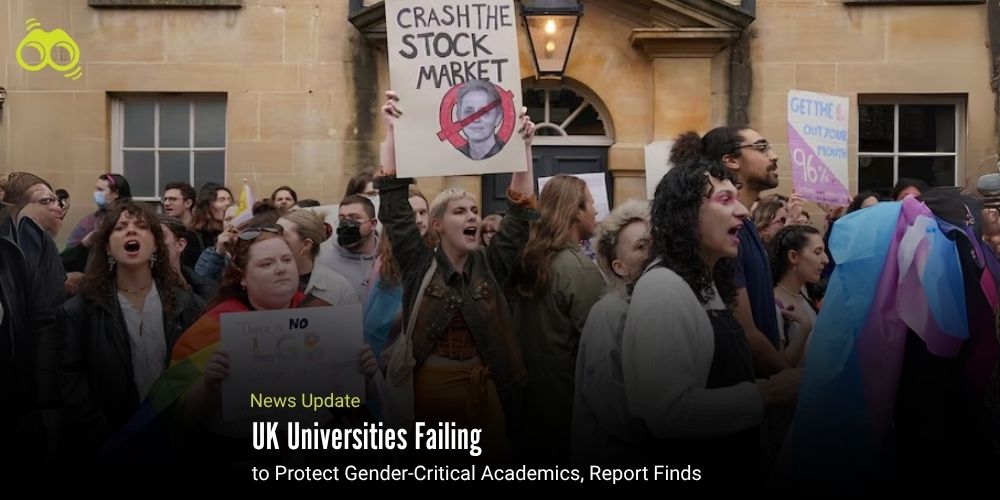Academic Freedom Under Threat: New Report Highlights Pressures on Sex and Gender Research
Sullivan Urges Tougher Measures to Protect Free Speech in Higher Education
In a forceful critique of the academic climate in the United Kingdom, Professor Alice Sullivan of University College London has warned that universities are failing to safeguard academic freedom, particularly for those holding gender-critical views. According to her latest report, many scholars face harassment and censorship simply for engaging with the biological and social dimensions of sex, raising serious concerns about the limits placed on open inquiry within institutions of higher learning.
Sullivan calls for stronger consequences for students and staff who participate in behaviour that suppresses free speech, arguing that freedom of expression must be defended as a core academic value. Her findings are especially timely, given that England’s updated Higher Education (Freedom of Speech) Act is set to come into force this August. This legislation aims to bolster researchers' rights, though Sullivan has called for similar protections across the entire UK.
The report builds on her March 2025 government-commissioned review into the challenges facing sex and gender-related research. Her call for evidence garnered 140 responses, mostly from individuals supporting gender-critical positions, which assert that biological sex is fixed and distinct from gender identity. Sullivan attributes the erosion of academic autonomy to the rise of managerial governance within universities and the precarious nature of academic careers, which she says has left researchers increasingly vulnerable to institutional and activist pressure.
Moreover, she argues that excessive bureaucracy has enabled activist interference in academic decision-making and urges institutions to evaluate their internal policies to avoid unintended consequences. Suppressing discussion on complex topics, she warns, not only damages institutional integrity and individual wellbeing but can also harm the very communities that some activists aim to support. The report also critiques the decline in democratic governance within universities, noting that most academic staff now have minimal influence on institutional decisions. It advises promoting healthy disagreement and cautions against treating exposure to differing views as grounds for mental health intervention.
Numerous submissions to the report described active suppression of sex and gender research, including projects being blocked or downgraded by peers or administration. Sullivan herself experienced this firsthand when a 2020 conference was cancelled following backlash against her proposed talk. Similarly, Professor Kathleen Stock recounted a sustained campaign of harassment against her gender-critical stance, culminating in her resignation from the University of Sussex after years of abuse both online and on campus.
In response to the report, a Universities UK spokesperson acknowledged the complexity of maintaining free speech while preventing campus environments from becoming hostile. They confirmed that universities must legally safeguard diverse viewpoints and stated that the organisation would review the report’s findings to help institutions meet this responsibility. Sullivan’s report reignites debate on whether British universities can truly remain spaces for open, inclusive inquiry without silencing unpopular or contested perspectives.
Editor’s Note
Professor Alice Sullivan’s report casts a stark and necessary spotlight on the current state of academic freedom within UK universities. Her findings indicate a troubling disparity between institutional commitments to diversity and inclusion and the protections afforded to scholars holding gender-critical views. When discussion around biological sex and gender identity is met with intimidation or professional repercussions, it is imperative to question whether our universities remain environments conducive to genuine academic debate. Academics like Professors Sullivan and Stock face opposition for expressing views within established discourse. Free inquiry must be inviolable; universities should be forums for robust idea exchange, not suppression. The report notes managerial dominance and activist pressure impacting research and freedom, urging intellectual resilience over censorship and cautioning against conflating disagreement with harm. While the new Higher Education (Freedom of Speech) Act in England offers a promising framework to bolster core academic values and safeguard researchers from undue pressure, legislation alone cannot achieve the desired outcome.
Skoobuzz believes that a fundamental cultural transformation is needed within academia, one that champions open inquiry, embraces diverse perspectives, and upholds evidence-based scholarship. The suppression of honest and rigorous academic work harms individual scholars and also compromises the integrity of the higher education sector at large.














0 Comments (Please Login To Continue)